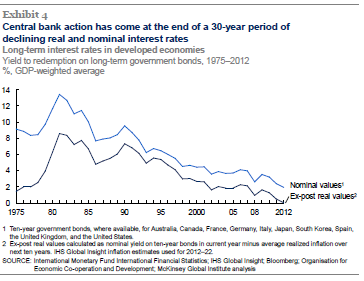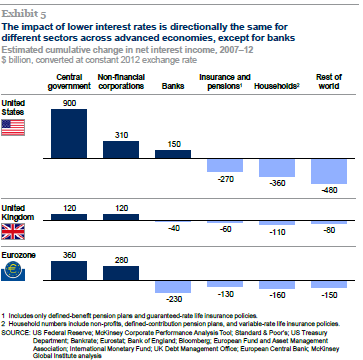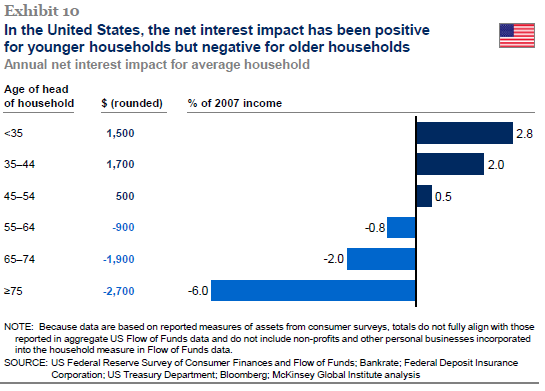L'espressione emerge negli anni Trenta. La si trova nel XXIV capitolo della Teoria Generale di J.M. Keynes (1). Laddove si sostiene che il capitale dovrebbe remunerare il rischio e la capacità, ma non la sua scarsità. Come i proprietari terrieri ottengono un rendita solo grazie alla scarsità della terra, così gli investitori che non hanno alcun ruolo produttivo sono remunerati solo per la scarsità di capitale.
Fossero remunerati poco o niente si avrebbero più investimenti – gli investimenti sono, infatti, tanto maggiori quanto minore è il costo del capitale – e quindi più occupazione. Proviamo a seguire la vicenda (2). Da anni sono scesi i tassi praticati dalle banche centrali alle banche di credito ordinario, così come sono scesi i rendimenti delle obbligazioni – primo grafico.


Quali sono stati gli effetti sui bilanci – nel periodo 2007-2012 quelli della largesse – dei componenti l'economia? Hanno guadagnato gli Stati e le imprese, ma non gli altri - secondo grafico. La discesa dei rendimenti delle obbligazioni ha apportato dei gran benefici ai bilanci pubblici grazie ai minori costi delle nuove obbligazioni collocate: i minori costi delle nuove obbligazioni collocate presso i privati, e il “ritorno” delle cedole ai Tesori – le banche centrali rendono, infatti, le cedole dei titoli acquistati. Anche le imprese hanno risparmiato sull'emissione di nuove obbligazioni. Lo stesso non può dirsi per le assicurazioni, i fondi pensione, e le famiglie, che ricevono un reddito dalle obbligazioni minore (anche se hanno - fino a poco tempo fa - guadagnato in conto capitale). Più complicata è la discussione sul sistema bancario che qui tralasciamo. Anche il Resto del Mondo ci rimette, perché il reddito delle obbligazioni detenute è sceso. La tabella della McKinsey – che cumula la variazione del reddito cedolare dal 2007 al 2012 – mostra il punto. Da notare che mancano gli effetti del 2013-2014-2015, che rendono ancora più marcato il fenomeno.
Insomma, i cittadini hanno usufruito di un minor costo del debito pubblico, ma sono stati penalizzati da un rreddito da interessi. Hanno guadagnato i giovani che sono indebitati e che hanno un minor onere da interessi, mentre gli anziani che detengono la ricchezza hanno un minor reddito da interessi – terzo grafico.

Finora con i tassi e i rendimenti bassi sono migliorati i bilanci statali e delle imprese, mentre, si è ridotto il reddito dei rentier (anziani), ma non si è avuta un forte crescita degli investimenti e dell'occupazione.
(1) Thus it is to our best advantage to reduce the rate of interest to that point relatively to the schedule of the marginal efficiency of capital at which there is full employment. (…) I feel sure that the demand for capital is strictly limited in the sense that it would not be difficult to increase the stock of capital up to a point where its marginal efficiency had fallen to a very low figure. This would not mean that the use of capital instruments would cost almost nothing, but only that the return from them would have to cover little more than their exhaustion by wastage and obsolescence together with some margin to cover risk and the exercise of skill and judgment. In short, the aggregate return from durable goods in the course of their life would, as in the case of short-lived goods, just cover their labour costs of production plus an allowance for risk and the costs of skill and supervision. Now, though this state of affairs would be quite compatible with some measure of individualism, yet it would mean the euthanasia of the rentier, and, consequently, the euthanasia of the cumulative oppressive power of the capitalist to exploit the scarcity-value of capital. Interest today rewards no genuine sacrifice, any more than does the rent of land. The owner of capital can obtain interest because capital is scarce, just as the owner of land can obtain rent because land is scarce. But whilst there may be intrinsic reasons for the scarcity of land, there are no intrinsic reasons for the scarcity of capital. (…) I see, therefore, the rentier aspect of capitalism as a transitional phase which will disappear when it has done its work. And with the disappearance of its rentier aspect much else in it besides will suffer a sea-change. It will be, moreover, a great advantage of the order of events which I am advocating, that the euthanasia of the rentier, of the functionless investor, will be nothing sudden, merely a gradual but prolonged continuance of what we have seen recently in Great Britain, and will need no revolution.
(2) http://www.mckinsey.com/insights/economic_studies/qe_and_ultra_low_interest_rates_distributional_effects_and_risks
© Riproduzione riservata












